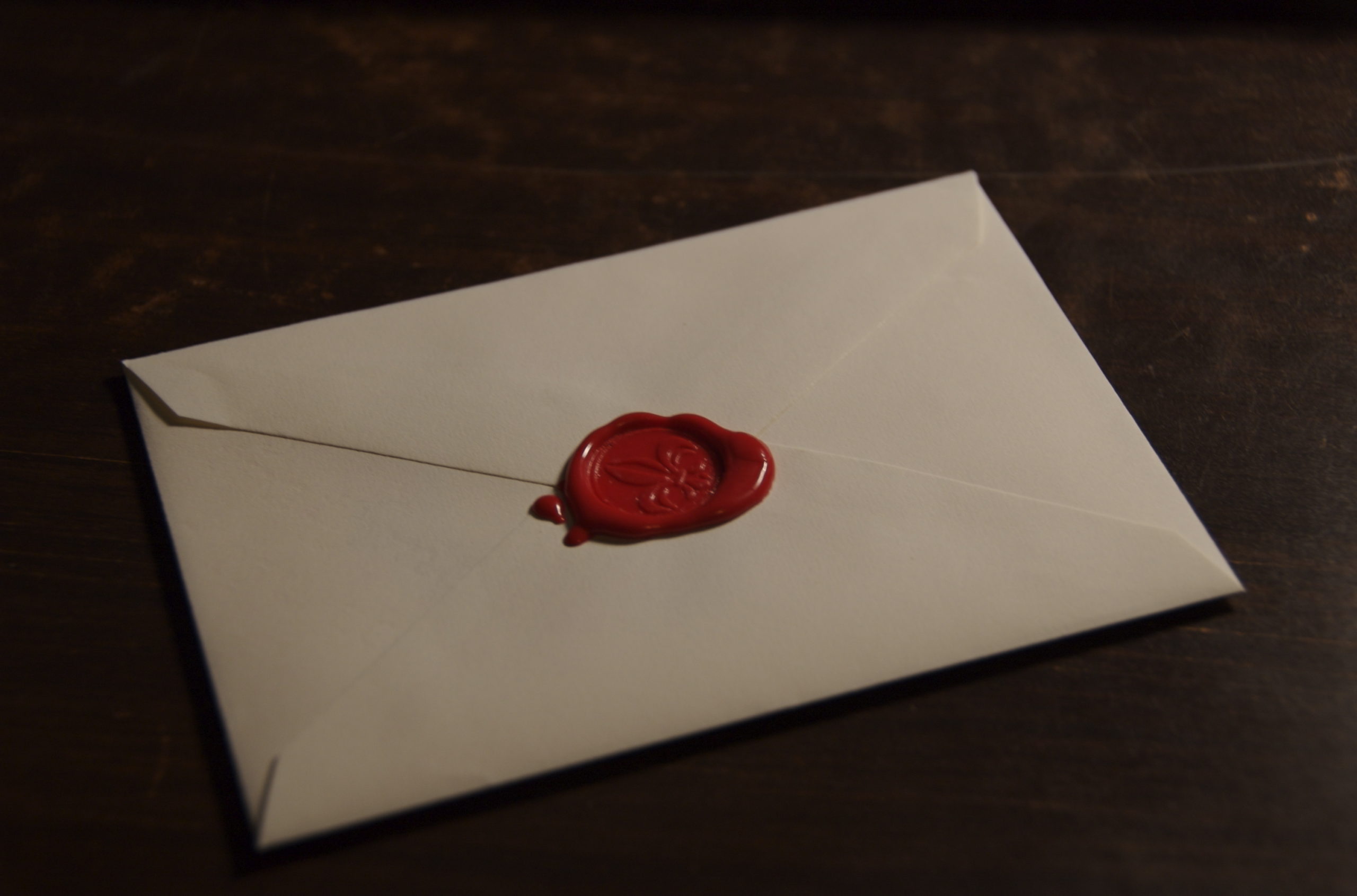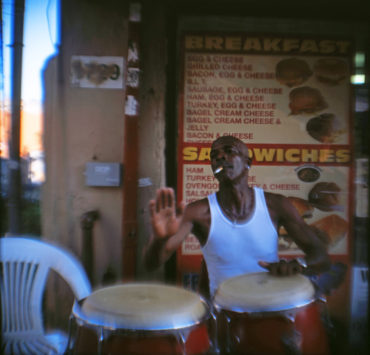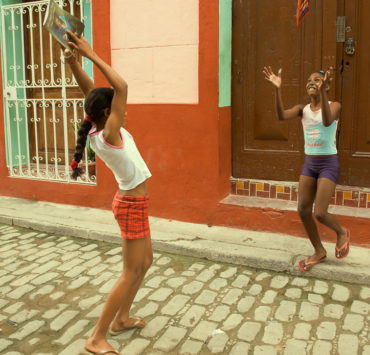
Sitting on my fire escape, I could see up the avenue beyond the Baptist church to Manny’s building—where he sold weed—and down past the bodega to the sneaker store two corners away. It was a good spot to see the mailman when he turned onto St. Nicholas Avenue. I’d been watching him for two weeks now.
“¡Bajate de alli! You make me nervous sitting out there,” Mami yelled from the living room. “He’s not going to come any faster because you’re waiting for him.” She pulled a long length of yarn from the tablecloth she was knitting, where apparently she’d made a mistake in the last row.
I couldn’t pry myself away from the fire escape though, at least not until I saw the mailman appear at the corner.
“What difference does it make whether you check the mail now or later in the afternoon?” She shook her head, the corners of her mouth tugged downwards.
It made all the difference in the world because my life was going to change with that letter and I wanted it to change now. This was the only way, since that day in Ms. Giulio’s room, months earlier.
“Okay kid,” Ms. Giulio sat at her desk, across from me, after closing the door to her classroom, “like what’s going on with you?” She folded her hands on stacks of papers and teacher’s edition textbooks, and leaned in. The fruity gum she chewed didn’t completely mask the smell of her morning coffee or cigarette.
I slumped in my chair and shrugged. I stared at my lap, picked at nothing on my maroon Pepe jeans.
Ms. Giulio opened a folder on her desk. “You’re in the top five percent of the eighth grade class. Your teachers have like, nothing but good things to say about you. Yet, here you are. Cutting class, hanging out with older boys from the neighborhood. I don’t get it.” She closed my file. “I told Ms. Sanchez I’d call your parents to inform them she caught you smoking.”
Tears simmered up to my eyes. I willed them not to spill over.
“Is there something going on at home?”
“Not really.” I stared out the window at the yard where the boys were playing basketball. “I just hate being home sometimes. I can’t really do anything.”
“Like what?”
“I don’t know. Just stupid small stuff everyone else gets to do. Like hang out after school or go to a friend’s house. Go to the movies. A birthday party. Walk somewhere by myself.”
“Why can’t you do those things?”
I sighed and recited, “Because my mom says hanging out is only for delinquents like my cousins and I can only go to a friend’s house if there are no men there. You know, no father, no brothers. And God only knows what we do at birthday parties or who’s there. And it’s dark in the movies. She says nothing good happens to a girl in the dark.”
Ms. Giulio sat back in her chair and blew a lock of her short, curly hair out of her face. “I understand you feel like…stifled.” She was the young cool English teacher, my homeroom teacher, still willing to look for angles and solutions. “Why don’t you apply for boarding school? It’ll get you out of the house, but on good terms.”
“I don’t know. Even if I did get in…”
“Of course you’d get in!” Ms. Giulio voice was adrenalized like when she liked someone’s interpretation of a story during class discussion.
“Even if I did get in,” I started again, “my mother’s not gonna go for it. I can’t even go down the block by myself, she’s not gonna let me cross state lines.”
“Why don’t we both talk to her?”
The next morning, Mami sat across from Ms. Giulio wearing her white Sunday blouse and jade skirt. She narrowed her eyes at me. On the train ride to my school that morning, Mami vacillated between complaining and threatening me. There was no convincing her that the teacher wanted to see her for anything good because they could have given her good news over the phone and let her get to work on time.
Ms. Giulio was doing fine with Mami until she told her where these private schools were located.
“¿Adonde? New Hampshire? Connecticut? ¿Mira muchacha de mierda, tu ‘ta loca?” Mami whipped around in her chair to face me.
Ms. Giulio was clearly unprepared, her doe eyes thrown wide open.
“Absolutamente, no.” Mami rummaged in her purse for I don’t know what.
“You act like it’s that far! I could come home for the holidays,” I protested.
“What child doesn’t sleep in their own house? I don’t even know what kind of people are over there, what supervision there is…”
“Oh, the faculty is like, very experienced and there’s a small student to teacher ratio,” Ms. Giulio chimed in.
Mami glared at her as if she was about to lambaste her too and Ms. Giulio shrunk into her chair.
“And you,” she said to me accusingly, “plotting behind my back.”
Tears surged from my eyes. I couldn’t stop them this time. “I want to go, Mami.”
“The only thing I ever wanted when I was a girl was to be home. Not spending summers with different aunts who’d never seen me before. Or uncles.” The hollow in her throat became deeper with her ragged breathing.
Mami didn’t grow up in her house, but she never talked about it. She never talked about any part of her that wasn’t me. The most she said was in saying nothing but stroking the faded burn scars on both her hands. Like she was doing now.
The crow’s feet around Mami’s eyes were so pronounced that I had to look away. She looked hurt and tired, something I’d never seen before.
“You think it’s better out there?” She pointed outside the window. “Ta bien,” she nodded. “Go.”
I should have been happy.
Every application that I filled out brought me closer to the day I would leave the prison tower of Mami’s love. It didn’t matter anymore that I couldn’t go to the movies with everyone on Friday or talk to a boy over the phone because I was leaving and never coming back. I was just biding my time and boarding school would only be the start. After graduation, I would go away to college and after that I would get a job and my own apartment. I had the next ten years of my life mapped out.
And my life—my real life—could start as soon as I got that letter.
“Mami, can I get the keys to the mailbox?”
She continued knitting, her long brown fingers dancing with the needles. “You know where they are.”
I climbed inside my room and walked over to the coat hooks by the front door. I dug my hand into one of her jackets and pulled out her set of keys. She had one of those laminated photo key chains with one of my baby photos inside. As I tugged on the front door—the humidity always made it expand—my heart raced.
I waited while the mailman dropped the mail in all the boxes. If you asked for your mail before he was finished, he’d ask you for ID and shoot you an irritated look.
I waited until he locked all the boxes before I dared to put Mami’s key into the lock. There was an electricity bill, a clothing catalog, and behind those, the letter. I tore into the slim envelope and read. Too slim of an envelope. It wasn’t big enough for a color brochure, financial aid forms and an acceptance letter.
My throat tightened until it hurt and I couldn’t see the stairs clearly. I opened the front door with a sob. Mami dropped her knitting into the bucket she kept beside her, ready with the next roll of yarn. She opened her arms reflexively and I threw myself into her embrace although I must’ve looked ridiculous sitting on her lap with my long legs dangling to the floor, like a kid that’s outgrown their stroller. She wiped my tears with her hand and reached into the pocket of her bata for a tissue.
“Dejame ver.” I handed her the envelope and she read it carefully, slowly translating the English into Spanish in her head.
I couldn’t stop crying long enough to form words.
“Ay mija,” she said, sighing. “Didn’t I tell you?”
I had applied to five boarding schools and this was the fifth letter to arrive. In the fall, Mami would time how long it should take me to get home from school and yell at the top of her lungs if I called her at work a minute late. She would listen in on my phone conversations from the kitchen receiver. Another year of not being allowed to go to parties or hanging out after class with the girls. Everything would stay the same.
Mami tucked the letter into her knitting bucket. I climbed back out onto the fire escape and watched the mailman zigzag his way up to Manny’s building. He was already outside in a white tank-top. The pastor’s sons were fighting in the church yard and up the street, in the opposite direction, a teenage girl was walking out of the bodega sipping from a can of soda and digging her fingers into a bag of chips. The guys in front of the bodega whistled and hollered at her, then called her a bitch when it was clear she wasn’t going to pay them any mind. I looked back inside the apartment to see Mami re-knitting the last row of the tablecloth. Inch by inch, it draped into the knitting bucket until I could no longer see the letter.
Image Credits: Justin Henry

Glendaliz Camacho is a 2013 Pushcart Prize nominee, 2014 Jentel Foundation Artist in Residence, and 2015 Caldera Arts, Kimmel Harding Nelson, and Hedgebrook Artist in Residence. She is a 2015 Write A House finalist. Glendaliz is a proud Voices of Our Nations Arts Foundation (VONA) alum. Her work appears in Soulmate 101 and Other True Stories of Love (Full Grown People); All About Skin: Short Fiction by Women of Color (University of Wisconsin Press); The Butter; Saraba Magazine; and Kweli Journal, among others. She has work forthcoming in The Female Complaint (Shade Mountain Press, 2015). Glendaliz is currently working on a short story collection and novel.







